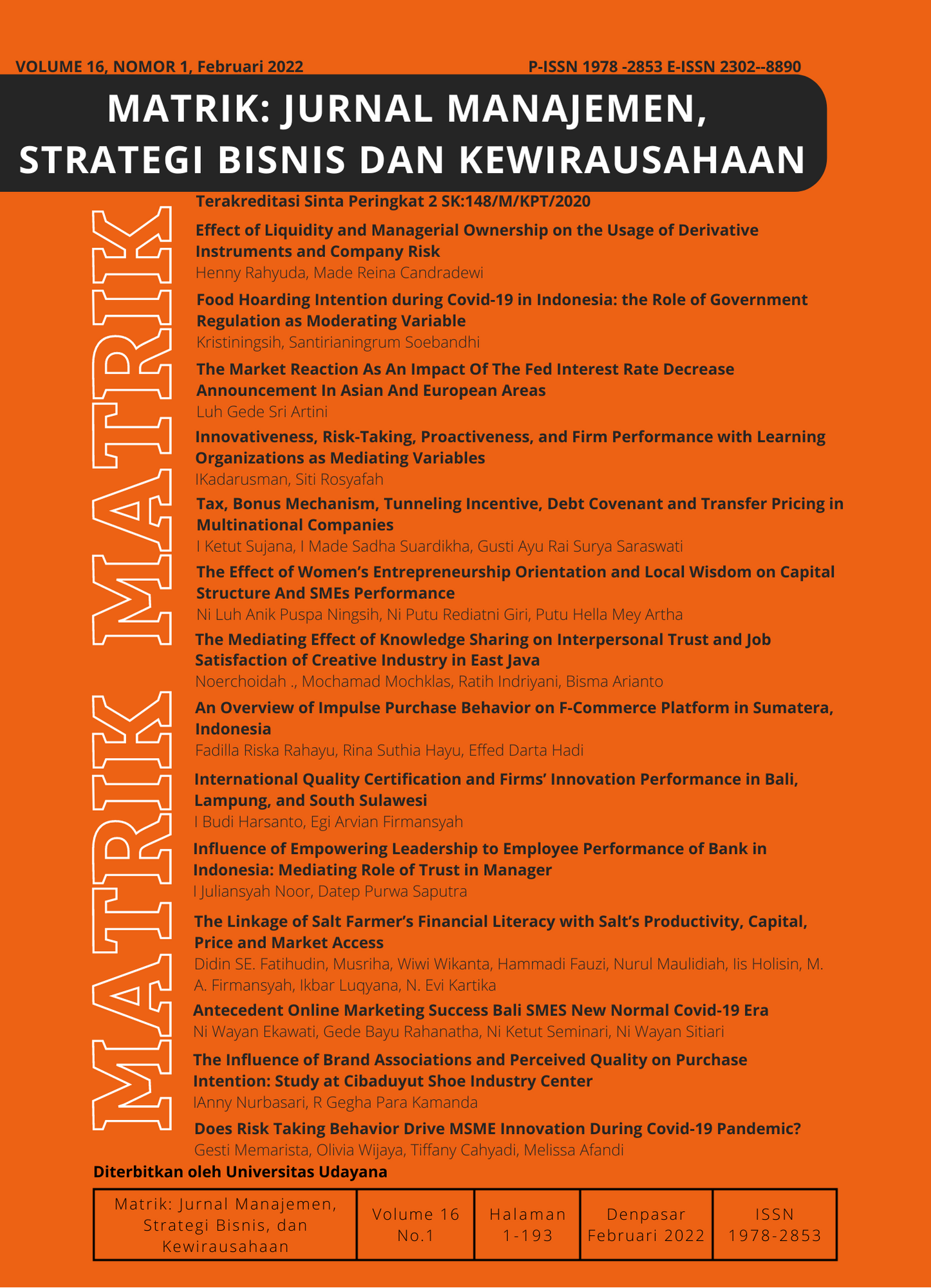The Mediating Effect of Knowledge Sharing on Interpersonal Trust and Job Satisfaction of Creative Industry in East Java
Abstract
The purpose of this study is to analyze the implication of multivariate relationship among interpersonal trust, knowledge sharing and job satisfaction in creative industry in East Java. This research uses 168 employees as respondents in order to test hypothesis. Data are processed using Partial Least Square (PLS) model. Empirical analysis shows that there are positive and significant relationships between interpersonal trust and knowledge sharing, knowledge sharing toward job satisfaction, also between interpersonal trust and job satisfaction. Furthermore, the result of this study shows that knowledge sharing acts positively as mediating variable between interpersonal trust and job satisfaction
Downloads
References
Akhavan, P., Rahimi, A., & Mehralian, G. (2013). Developing a model for knowledge sharing in research centers. Vine, 43(3), 357–393. https://doi.org/10.1108/VINE-06-2012-0020
Almahamid, S., McAdams, A. C., & Kalaldeh, T. (2010). The relationships among organizational knowledge sharing practices, employees’ learning commitments, employees’ adaptability, and employees’ job satisfaction: An empirical investigation of the Listed Manufacturing Companies in Jordan. Interdisciplinary Journal of Information, Knowledge, and Management, 5(January), 327–356. https://doi.org/10.28945/1225
AlShamsi, O., & Ajmal, M. (2018). Critical factors for knowledge sharing in technology-intensive organizations: evidence from UAE service sector. Journal of Knowledge Management, 22(2), 384–412. https://doi.org/10.1108/JKM-05-2017-0181
Bakker, M., Leenders, R. T. A. J., Gabbay, S. M., Kratzer, J., & Van Engelen, J. M. L. (2006). Is trust really social capital? Knowledge sharing in product development projects. Learning Organization, 13(6), 594–605. https://doi.org/10.1108/09696470610705479
Bandura. (1977). Translating national policy to improve environmental conditions impacting public health through community planning. Psychological Review, 84(2), 191–215. https://doi.org/10.1007/978-3-319-75361-4
Chow, W. S., & Chan, L. S. (2008). Social network, social trust and shared goals in organizational knowledge sharing. Information and Management, 45(7), 458–465. https://doi.org/10.1016/j.im.2008.06.007
Chung, E. K., Jung, Y., & Sohn, Y. W. (2017). A moderated mediation model of job stress, job satisfaction, and turnover intention for airport security screeners. Safety Science, 98, 89–97. https://doi.org/10.1016/j.ssci.2017.06.005
Curado, C., & Vieira, S. (2019). Trust, knowledge sharing and organizational commitment in SMEs. Personnel Review, 48(6), 1449–1468. https://doi.org/10.1108/PR-03-2018-0094
Erkutlu &, & Chafra. (2015). The mediating roles of psychological safety and employee voice on the relationship between conflict management styles and organizational identification. American Journal of Business, 30(1), 72–91.
Eze, U. C., Goh, G. G. G., Goh, C. Y., & Tan, T. L. (2013). Perspectives of SMEs on knowledge sharing. Vine, 43(2), 210–236. https://doi.org/10.1108/03055721311329963
Guinot, J., Chiva, R., & Roca-Puig, V. (2014). Interpersonal trust, stress and satisfaction at work: An empirical study. Personnel Review, 43(1), 96–115. https://doi.org/10.1108/PR-02-2012-0043
Heyns, M., & Rothmann, S. (2015). Dimensionality of trust: An analysis of the relations between propensity, trustworthiness and trust. SA Journal of Industrial Psychology, 41(1), 1–12. https://doi.org/10.4102/sajip.v41i1.1263
Hsu, M. H., & Chang, C. M. (2012). Examining interpersonal trust as a facilitator and uncertainty as an inhibitor of intra-organisational knowledge sharing. Information Systems Journal, 24(2), 119–142. https://doi.org/10.1111/isj.12000
Joseph F. Hair, J., Black, W. C., Babin, B. J., & Anderson, R. E. (2010). Multivariate Data Analysis (7th Editio). Prentice Hall International, Inc. https://doi.org/10.2307/1266874
Kelly, T., Lercel, D., & Patankar, M. (2015). Influence of Trust and Job Satisfaction on Safety Climate among Managers at a Large U.S. Air Carrier. Management and Organizational Studies, 2(2). https://doi.org/10.5430/mos.v2n2p57
Kianto, A., Vanhala, M., & Heilmann, P. (2016). The impact of knowledge management on job satisfaction. Journal of Knowledge Management, 20(4), 621–636. https://doi.org/10.1108/JKM-10-2015-0398
Kim, T. Y., Wang, J., & Chen, J. (2018). Mutual Trust Between Leader and Subordinate and Employee Outcomes. Journal of Business Ethics, 149(4), 945–958. https://doi.org/10.1007/s10551-016-3093-y
Leat, M., & El-Kot, G. (2009). Interpersonal trust at work, intrinsic motivation, work-related tension and satisfaction in Egypt. International Journal of Workplace Health Management, 2(2), 180–194. https://doi.org/10.1108/17538350910970237
Malik, M. S., & Kanwal, M. (2018). Impacts of organizational knowledge sharing practices on employees’ job satisfaction. Journal of Workplace Learning, 30(1), 2–17. https://doi.org/10.1108/jwl-05-2016-0044
Mayer, R. C., Davis, J. H., & Schoorman, F. D. (1995). Model of Trust Theory. The Academy of Management Review, 20(3), 709–734.
Mirzaee, S., & Ghaffari, A. (2018). Investigating the impact of information systems on knowledge sharing. Journal of Knowledge Management, 22(3), 501–520. https://doi.org/10.1108/JKM-08-2017-0371
Mohammed, N., & Kamalanabhan, T. J. (2019). Interpersonal trust and employee knowledge sharing behavior: Creative performance as the outcome. VINE Journal of Information and Knowledge Management Systems, 50(1), 94–116. https://doi.org/10.1108/VJIKMS-04-2019-0057
Mora, T., & Ferrer-i-Carbonell, A. (2009). The job satisfaction gender gap among young recent university graduates: Evidence from Catalonia. Journal of Socio-Economics, 38(4), 581–589. https://doi.org/10.1016/j.socec.2009.02.003
Nerstad, C. G. L., Searle, R., Černe, M., Dysvik, A., Škerlavaj, M., & Scherer, R. (2018). Perceived mastery climate, felt trust, and knowledge sharing. Journal of Organizational Behavior, 39(4), 429–447. https://doi.org/10.1002/job.2241
O’Connor, J. (2018). The impact of job satisfaction on the turnover intent of executive level central office administrators in texas public school districts: A quantitative study of work related constructs. Education Sciences, 8(2). https://doi.org/10.3390/educsci8020069
Oh, Y., & Park, J. (2011). New link between administrative reforms and job attitude: The role of interpersonal trust in peers as a mediator on organizational commitment. International Review of Public Administration, 16(3), 65–87. https://doi.org/10.1080/12294659.2011.10805208
Ouakouak, M. L., & Ouedraogo, N. (2019). Fostering knowledge sharing and knowledge utilization: The impact of organizational commitment and trust. Business Process Management Journal, 25(4), 757–779. https://doi.org/10.1108/BPMJ-05-2017-0107
Rhee, K. Y. (2010). Different effects of workers’ trust on work stress, perceived stress, stress reaction, and job satisfaction between Korean and Japanese workers. Safety and Health at Work, 1(1), 87–97. https://doi.org/10.5491/SHAW.2010.1.1.87
Rotenberg, K. J. (2010). Interpersonal Trust During Childhood and Adolescence. Cambridge University Press.
Rutten, W., Blaas - Franken, J., & Martin, H. (2016). The impact of (low) trust on knowledge sharing. Journal of Knowledge Management, 20(2), 199–214. https://doi.org/10.1108/JKM-10-2015-0391
Safari, A., Barzoki, A. S., & Heidari Aqagoli, P. (2020). Exploring the antecedents and consequences of impersonal trust. International Journal of Organizational Analysis, 28(6), 1149–1173. https://doi.org/10.1108/IJOA-08-2019-1850
The, P. L., & Sun, H. (2012). Knowledge sharing, job attitudes and organisational citizenship behaviour. Industrial Management and Data Systems, 112(1), 64–82. https://doi.org/10.1108/02635571211193644
Trivellas, P., Akrivouli, Z., Tsifora, E., & Tsoutsa, P. (2015). The Impact of Knowledge Sharing Culture on Job Satisfaction in Accounting Firms. The Mediating Effect of General Competencies. Procedia Economics and Finance, 19(15), 238–247. https://doi.org/10.1016/s2212-5671(15)00025-8
Wang, S., & Noe, R. A. (2010). Knowledge sharing: A review and directions for future research. Human Resource Management Review, 20(2), 115–131. https://doi.org/10.1016/j.hrmr.2009.10.001
 This work is licensed under a Creative Commons Attribution-ShareAlike 4.0 International License.
This work is licensed under a Creative Commons Attribution-ShareAlike 4.0 International License.

















